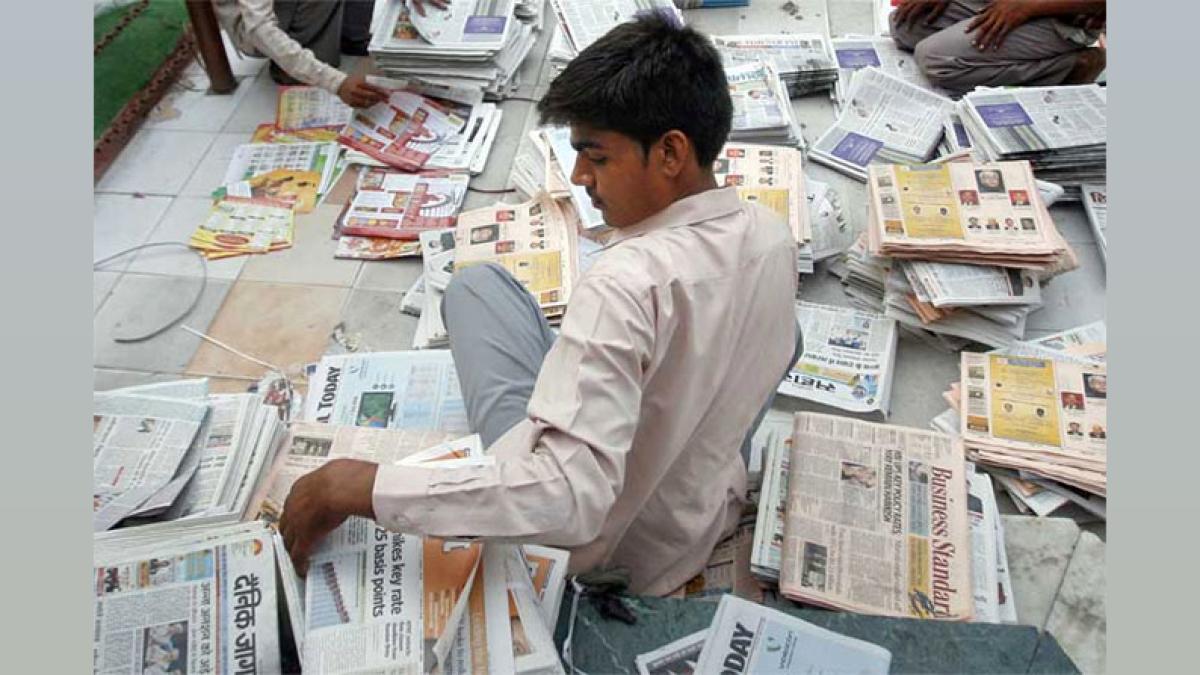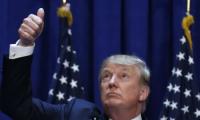India Elections 2023: Pivotal for Democracy - US Professor
US Professor Irfan Nooruddin says India's 2023 elections are pivotal, addressing concerns about democratic backsliding, opposition, media freedom, and more. He highlights the need for a strong opposition and a balanced approach to governance.

Washington, Apr 17 (PTI) The parliamentary elections set to begin this week in India are the most pivotal in a while, an eminent Indian-American professor said here Tuesday.
Georgetown University professor Irfan Nooruddin, in an interview to PTI, said the criticism regarding democratic backsliding in India seem a bit overblown but using tax authorities to target politicians requires greater scrutiny.
The elections are the most pivotal that we've had in a while. On the one hand, you have a majority government that is looking to expand its majority, but this is against the backdrop of growing concerns, both in India but also abroad, that India might be experiencing democratic backsliding, concerns about opposition, intimidation, especially the high profile arrest of Chief Minister Arvind Kejriwal and concerns about media freedom, said Nooruddin, the Hamad bin Khalifa Al Thani Professor of Indian Politics at the prestigious Georgetown University.
But at the end of the day, it is for the Indian people. And I think the world will be looking at how the turnout rate is and how competitive are the elections are so that regardless of what the outcome is, the faith in India's democracy is restored and once again, he said.
Concerns about democracy in India seem a bit overblown because at the moment we still have a really competitive party landscape, with lots of parties speaking quite freely and critically of the government, Nooruddin said.
That is part of what it means to be a democracy, he added.
On the other hand, I think concerns especially about the use of the tax authorities to apparently target particular politicians and public figures is something that requires greater scrutiny. Obviously, the judicial system will have its say, and we hope that that occurs independently, the professor said.
The electoral bonds issue and questions around media freedom I the country are also important, Nooruddin said.
India has such a diverse and fragmented media landscape, but ensuring that people feel like they can raise criticisms without repercussion is critical. I think there are legitimate questions being asked, but overall it is for the Indian people to reaffirm the faith in democracy that all of us have, he said.
Nooruddin said the greatest gain for India is the recent confidence on the world stage, where he said that India asserts its power as the largest nation in the world.
You also have rising economic growth. That is a continuation, I would argue, of the previous government. So, lots of good work over the last 25 years has led India to increasingly approach a middle income status. The current government has been aggressive about courting foreign investment, making it more attractive for big manufacturing companies, Tesla, Apple, et cetera, to open cutting edge manufacturing facilities in India, he said.
What have we lost? I mean, that is too hard to say. But I think the sense that there is greater communal tension and that Muslims in particular feel a little more disenfranchised, a little more marginalized within the society is very scary because it is something that most Indians take great pride in. There is a Lokniti survey that tells us that all Indians see plurality as a key hallmark of India. And so any loss of that, even if it's small, is unfortunate and needs to be addressed, he said.
The key focus, should the prime minister have a third term, is to assure all Indians, regardless of the religion, regardless of caste, category and also regardless of the region of the country that they're from, that his government stands for all of them, the professor said.
We have a growing north-south divide in terms of economic development and economic performance that needs to be addressed. One of the key features of India's democracy has always been a deep federalism.
There have been important strides to rationalising the tax code in from most prominently the goods and services tax GST, but if the states feel like the centre is beginning to encroach on issues that were previously state subjects, this might worsen a sense that the southern states in particular feel like more political power has gone to the north, even though they are the economic engine, he said.
Nooruddin also raised the issue of urban-rural divide, and added that ruling a country as vast and diverse as India requires a great deal of skill. Mr. Modi has shown his ability to do this previously in Gujarat. He has to do it once again if he's given the opportunity to do so in a third term, he said.
He said that a weak opposition in India is an issue of concern. The opposition is the strongest protection against creeping authoritarianism in any society. We need an opposition that is capable of mobilising citizens, raising difficult questions, not just being obstructionist, but actually being constructive and offering an alternative vision for the future, he said.
'Congress Mukta Bharat', to use a phrase popular in some parts of the social landscape, is not a good India. Not because of the Congress party per se, but because India that doesn't have a strong vocal opposition is a weaker, India is a weaker democracy.
The regional parties in the south remain strong but there is a need to have a national voice that provides an alternative narrative for what India can be and provides a check and constraint on the ruling party, he said.
The BJP did this very effectively when the UPA was in charge, and I believe that their government, given a third opportunity to rule, would also be strengthened by having to counter a vibrant opposition, Nooruddin said.
Georgetown University professor Irfan Nooruddin, in an interview to PTI, said the criticism regarding democratic backsliding in India seem a bit overblown but using tax authorities to target politicians requires greater scrutiny.
The elections are the most pivotal that we've had in a while. On the one hand, you have a majority government that is looking to expand its majority, but this is against the backdrop of growing concerns, both in India but also abroad, that India might be experiencing democratic backsliding, concerns about opposition, intimidation, especially the high profile arrest of Chief Minister Arvind Kejriwal and concerns about media freedom, said Nooruddin, the Hamad bin Khalifa Al Thani Professor of Indian Politics at the prestigious Georgetown University.
But at the end of the day, it is for the Indian people. And I think the world will be looking at how the turnout rate is and how competitive are the elections are so that regardless of what the outcome is, the faith in India's democracy is restored and once again, he said.
Concerns about democracy in India seem a bit overblown because at the moment we still have a really competitive party landscape, with lots of parties speaking quite freely and critically of the government, Nooruddin said.
That is part of what it means to be a democracy, he added.
On the other hand, I think concerns especially about the use of the tax authorities to apparently target particular politicians and public figures is something that requires greater scrutiny. Obviously, the judicial system will have its say, and we hope that that occurs independently, the professor said.
The electoral bonds issue and questions around media freedom I the country are also important, Nooruddin said.
India has such a diverse and fragmented media landscape, but ensuring that people feel like they can raise criticisms without repercussion is critical. I think there are legitimate questions being asked, but overall it is for the Indian people to reaffirm the faith in democracy that all of us have, he said.
Nooruddin said the greatest gain for India is the recent confidence on the world stage, where he said that India asserts its power as the largest nation in the world.
You also have rising economic growth. That is a continuation, I would argue, of the previous government. So, lots of good work over the last 25 years has led India to increasingly approach a middle income status. The current government has been aggressive about courting foreign investment, making it more attractive for big manufacturing companies, Tesla, Apple, et cetera, to open cutting edge manufacturing facilities in India, he said.
What have we lost? I mean, that is too hard to say. But I think the sense that there is greater communal tension and that Muslims in particular feel a little more disenfranchised, a little more marginalized within the society is very scary because it is something that most Indians take great pride in. There is a Lokniti survey that tells us that all Indians see plurality as a key hallmark of India. And so any loss of that, even if it's small, is unfortunate and needs to be addressed, he said.
The key focus, should the prime minister have a third term, is to assure all Indians, regardless of the religion, regardless of caste, category and also regardless of the region of the country that they're from, that his government stands for all of them, the professor said.
We have a growing north-south divide in terms of economic development and economic performance that needs to be addressed. One of the key features of India's democracy has always been a deep federalism.
There have been important strides to rationalising the tax code in from most prominently the goods and services tax GST, but if the states feel like the centre is beginning to encroach on issues that were previously state subjects, this might worsen a sense that the southern states in particular feel like more political power has gone to the north, even though they are the economic engine, he said.
Nooruddin also raised the issue of urban-rural divide, and added that ruling a country as vast and diverse as India requires a great deal of skill. Mr. Modi has shown his ability to do this previously in Gujarat. He has to do it once again if he's given the opportunity to do so in a third term, he said.
He said that a weak opposition in India is an issue of concern. The opposition is the strongest protection against creeping authoritarianism in any society. We need an opposition that is capable of mobilising citizens, raising difficult questions, not just being obstructionist, but actually being constructive and offering an alternative vision for the future, he said.
'Congress Mukta Bharat', to use a phrase popular in some parts of the social landscape, is not a good India. Not because of the Congress party per se, but because India that doesn't have a strong vocal opposition is a weaker, India is a weaker democracy.
The regional parties in the south remain strong but there is a need to have a national voice that provides an alternative narrative for what India can be and provides a check and constraint on the ruling party, he said.
The BJP did this very effectively when the UPA was in charge, and I believe that their government, given a third opportunity to rule, would also be strengthened by having to counter a vibrant opposition, Nooruddin said.
You May Like To Read
TODAY'S MOST TRADED COMPANIES
- Company Name
- Price
- Volume
- Vodafone Idea L
- 7.51 ( -5.42)
- 108437525
- Murae Organisor
- 1.65 (+ 4.43)
- 61768585
- Spicejet Ltd.
- 54.25 (+ 1.36)
- 17495165
- Suzlon Energy Ltd.
- 58.20 ( -3.21)
- 17067100
- Enbee Trade & Fi
- 0.81 ( -4.71)
- 15690698







 © 2025 Rediff.com India Limited. All rights reserved.
© 2025 Rediff.com India Limited. All rights reserved.